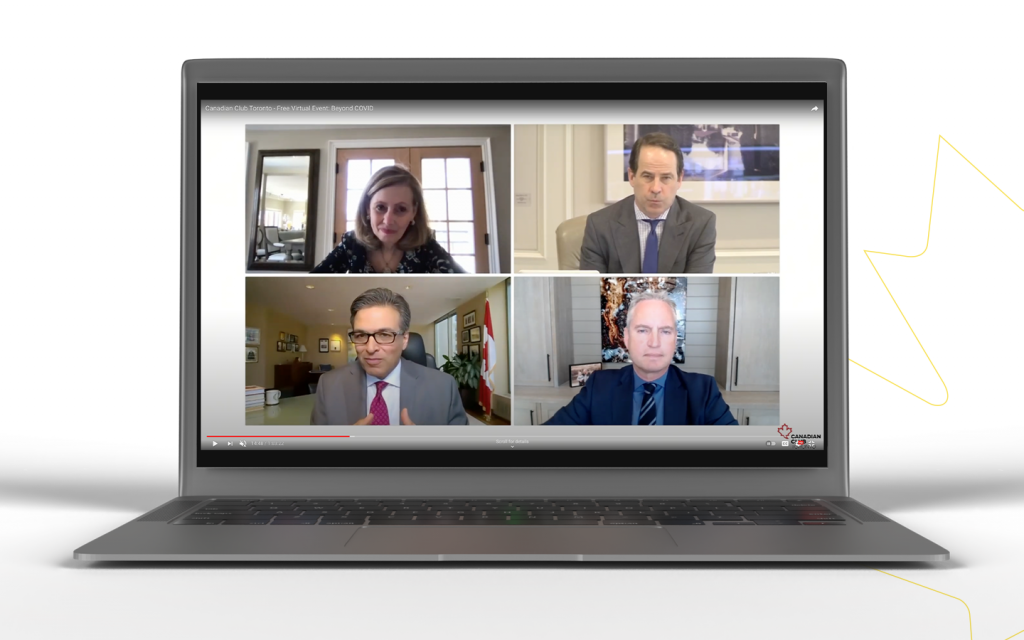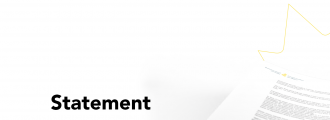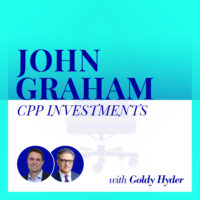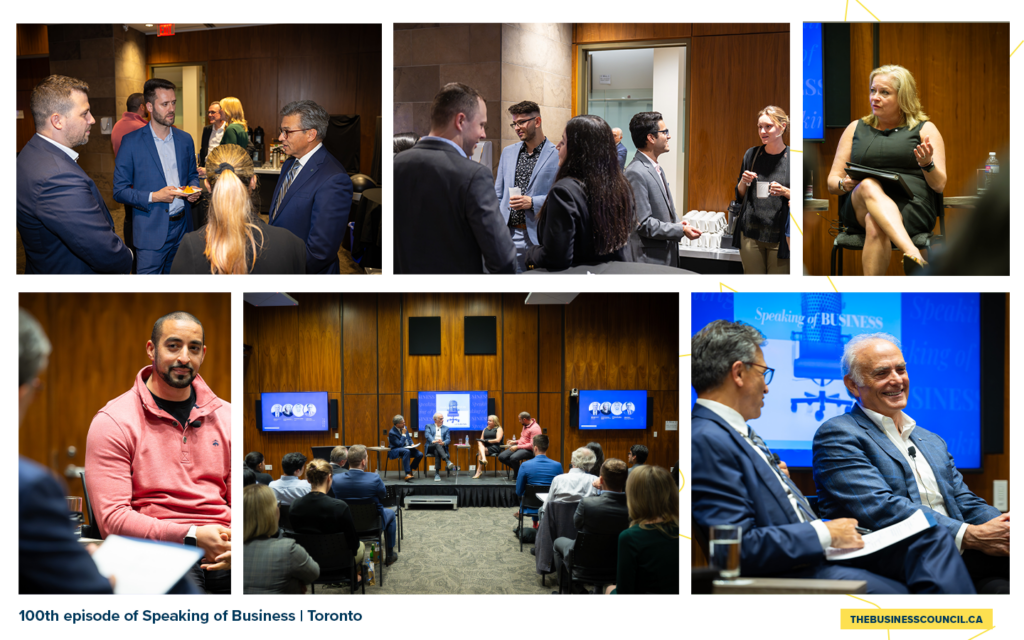On April 19th Finance Minister Chrystia Freeland will unveil Canada’s first federal budget in more than two years – a budget she has described as the most significant of our lifetimes.
What will it take to build a stronger, healthier and more resilient economy after the pandemic?

In a timely conversation at the Canadian Club Toronto, Goldy Hyder discusses the path forward with Monique Leroux, Chair of the Industry Strategy Council, Mark Little, President and CEO of Suncor Energy and Darryl White, CEO of BMO Financial Group.
Goldy Hyder:
Welcome to Speaking of Business. I’m Goldy Hyder, president and CEO of the Business Council of Canada. A year into the COVID-19 pandemic, we sure have been through a lot together. I am optimistic though, sometime in 2021, Canadians are going to achieve herd immunity and the pandemic is hopefully behind us. But Canada’s economic picture is less rosy. We face persistent unemployment, a ballooning deficit and an increasingly competitive world. Later this month, finance minister, Chrystia Freeland, will unveil the country’s first federal budget in more than two years. She’s described it as the most significant budget of our lifetimes. So what will it take to power a strong economic recovery? Last week at the Canadian Club Toronto, I discussed that question with three visionary business leaders. Monique Leroux, chair of Canada’s Industry Strategy Council, Mark Little, president and CEO of Suncor Energy, and Darryl White, CEO of BMO Financial Group. I’d like to share that conversation with you today. Our discussion began with Darryl. I asked him how optimistic he was about our economic recovery in the short to midterm. Take a listen.
Darryl White:
Goldy, the short answer is I’m actually very optimistic as we look through this valley over the next couple of three, four months, where we’re going to see increased vaccinations and presumably re-openings. Barring a big resurgence of the virus and going back to environments of shutdowns, I think we can look for economic development to be frankly, about as strong as we’ve seen in terms of a rebound in about a half a century. I think we will look for about 6% economic recovery in terms of GDP in Canada. And we may be higher than that. We’ll probably be higher than that six and a half, 7% in the United States. And that’s very profound. And if it carries on at even half of that level into 2022, that’ll be the biggest burst of activity over the course of 18 months since the Reagan administration. So the punchline, I would say, post reopening and herd immunity, Goldy is extraordinarily strong and it’s fed by many factors, including the ones that you know the easing of the restrictions, the stimulus that still has to be distributed, the fact that energy prices, as Mark knows, are doing well and increasingly doing well, global demand picks up, and we’ve got elevated household savings, Goldy, that we see all the way across our system despite geography and despite sector.
Darryl White:
So I think there’s a lot of cause for optimism on the punchline. There’s a, but though. And the, but is I’m not confident that the reopening and the resurgence of that economy happens equitably. And we know that the virus doesn’t think about where it affects different sectors differently. And I think what we’re going to see is that the resurgence also is not going to be evenly distributed just as it was unevenly distributed on the way down. It’s very difficult when we don’t have targeted relief programs. So there, I’ve been an advocate. I’ve talked about it, I’ve written about it. To be more and more targeted in our relief programs from the banking sector, as well as from government, we look at businesses that are affected across the spectrum. Not just small businesses, large businesses as well, whether they be airlines, hotels, tourism, anything that’s mobility and density. We are not out of the woods yet. We’re a long way from out of the woods yet there.
Darryl White:
I think another watch out, Goldy, is on the rising levels of household debt. So while, the savings rate has increased and so has the debt. And right now, it feels fine because the savings rate is so high and asset values and households in Canada are high i.e. their home. The reality is we will have a period at some point of rising interest rates, and that’s a bit of a risk to the recovery as well. So net-net, the answer, Goldy, is as positive as I’ve been in my entire career, but we have some really clear watch outs in terms of sectors that get left behind. And there’s some structural unemployment that we have to worry about as we look at an overall average that the de-averaging is where the real work is still needed to be done.
Goldy Hyder:
Great. Alot there that we’re going to come back to, actually, I do want to return to that notion of the uneven recovery, and we’ll definitely come back to that. But Monique, you were busy during this pandemic leading a group of business leaders across the country, cross sectoral and really looking at a longer term view. But to get the long-term right, you got to get the foundation right. In the short term, despite the fact that things look like they’re gonna bounce back quite robustly, what are the things that you think Canada needs to do to prepare itself for the longer term?
Monique Leroux:
Well, thank you for the question. And let me start saying that I’m also very optimistic and I share very much what you said, Darryl. So I’m pretty much aligned with your own perspective. I have five ideas that I would like to put forward for discussion maybe during the session. The first is that when I look at the situation, even though I’m optimistic, the first, first priority is to continue to expand, accelerate vaccination, testing, distribution and, of course, production, eventually. Making sure to have a very strong partnership with provinces and the business sector. There are some interesting experiences, if I take Quebec as one example, but I’m sure that Mark will be also commenting on that in his own province. We need to bring acceleration of that, not only because we want to do it fast, but we need to get used to a new normal. We will need, for the coming year, to have testing, vaccination going on, and we need to make sure to align the private sector to contribute.
Monique Leroux:
The second idea is pretty much in line with Darryl. We need absolutely to stabilize and secure some hardest-hit sectors like the airlines, like tourism, because I don’t expect that they will be able to resume their activities soon. So we need to make sure to stabilize and secure in order to protect some of the strategic assets that we have, for example, in the airline industry. The third is that I think that governance in general, at the level of the provinces, but also at the federal level, need to fast track some cross sectoral programs that are very important to accelerate recovery on the short-term basis. And I’m talking about training, re-skilling. I’m talking about digital infrastructure and connectivity. And frankly speaking, I was very pleased by the joint announcement, which was made yesterday with Mr. Trudeau and M. Legault regarding some additional connectivity, fast internet in the province.
Monique Leroux:
We need to go in that direction. The fourth idea is that I hope, and with the support of everybody, that the budget, the provincial budgets but also the federal budget, will bring comprehensive action plan with a long-term vision for the country, building on a lot of public investments, which will be made and announced, but in a way that will, I guess, encourage the private sector to contribute in order to have a very intentional plan for building back this country. And we can certainly talk about it later on in the conversation. And I will conclude my fifth idea, is really to find a way across the country to have a renewed partnership between the public sector and the private sector. I think that we need to work together. We have fabulous opportunities. There is a timing for it, and time is now.
Goldy Hyder:
Excellent. Thank you, Monique. Again, lots of themes there that I think we can unpack over the course of our discussion. Let me go to you, Mark. I mean, you talked about having a roller coaster ride. And a year ago, your energy sector was hit with not only the pandemic, but a real oil and gas crisis for different reasons. I think the barrel hit negative numbers. And now things seem to be feeling a little bit better as Darryl has suggested. How critical is the natural resources sector to our recovery?
Mark Little:
Well, thank you, Goldy. It’s huge for us. And quite frankly, I would echo Darryl’s optimism associated with that particularly in the sector. This is the largest sector of the Canadian economy. It makes up about 11 and a half percent of GDP, not counting the investment that the industries make within the country. If you include that, it’s over 15% of the GDP of the country is driven by this one sector. And the great thing about it is this has been a huge challenge as you pointed out. It also makes up about 50% of all the exports from the country come out of the resource sector. So it’s super important for us accessing global financial markets and such. And the one thing that’s really interesting right now is you’re starting to see all of the commodity sectors and the resource sector getting really good prices. Now, all is probably overstating it because in each area, whether it’s in mining, whether it’s in forestry or whether it’s in oil and gas, there’s portions where they’re okay, or in some cases weak. But predominantly, the sectors are getting very good prices, particularly in the mining sector.
Mark Little:
If you look at gold, that looks like we’ll end up having what could be the best year in five years. Coal is looking like it’s probably one of the top three years in the last 10. Iron ore, best pricing in seven years. Lumber prices, the best we’ve seen in a decade, and oil prices now are strong. It’s probably going to be in the top three years we’ve had since 2014 if prices stabilize. Now, oil and gas is still very, very volatile. But because it’s such a massive part of the Canadian economy, and then you’re seeing all of these sectors starting to see, I would say, solid to very strong pricing, if not record pricing in the last five to 10 years, this is actually a huge help in moving forward the Canadian economy at a time where we really need it.
Mark Little:
So I think the resource sector is going to be a disproportionate contributor this year. And one of the things that’s really interesting about it, if we take the oil sector as an example, many of the industries, or many of the oil sectors outside of Canada don’t have long life resource. And so, they have to invest a lot of money to maintain their production. That’s not true in Canada. In fact, in the last part of 2020, and the first part of ’21, we’re starting to see record production coming out of Canada, which is really good. Our ability to invest and grow is somewhat limited because of pipeline access.
Goldy Hyder:
So, Mark, I’m thinking of what the audience is thinking as they’re listening to you. And I think one of the things, of course, is, well, what about climate change? What is the energy sector doing with climate change? What is the responsibility that you feel? And you’ve talked about capital forming and so forth, where is the innovation coming from?
Mark Little:
Well, it’s interesting. Maybe if I could just frame this up and provide a little perspective on climate before I talk about innovation and such. But when you look at it, last year during the global pandemic, you saw about an 8% reduction in GHG emissions globally. And just look at the economic consequences. Global GDP is down something like 5% through that period of time. We locked down the economies and such. So, I think the sense that climate is going to be easy. COVID actually puts that in and 2020 foot that into a frame. It’s anything but easy. And often this year, it came with a huge consequence to get an 8% reduction in greenhouse gas emissions. We have an enormous challenge ahead of us. In Canada, we produce about 730 mega tons a year. And so it’s kind of like, “Okay, we need to be able to go and deal with this.”
Mark Little:
But there’s two things about climate that people in Canada, I think, often don’t realize. One, it’s estimated that 45% of our emissions are actually related to our exports, the products that we export out of the country. So it’s kind of like, look, if we could get our consumption for what we’re doing and living every single day, we would still have half our emissions that we need to deal with. So I think that’s really important when we start thinking about how we position the country around Article Six in the Paris Agreement, which allows us to go and help other countries reduce their emissions and put the credits back against the emissions that we’re admitting here. Essentially, these are emissions that we’re producing to help other countries be successful. Some of that’s offset with imports where they’re doing the same for us, but it’s still a big net add to our emissions profile.
Mark Little:
And then the second one that I think is super important to note is, we don’t count our natural environment, right? This is like, set aside the natural environment, now let’s talk about climate. That’s tough for Canada because one of the things that drives up our emissions as a big country, we do lots of travel within the country and such associated with it. And Wikipedia at least counts the number of trees we have in the country at 318 billion. But we can’t count those. We set those aside. That’s actually a bit of a challenge. So when you think of it scientifically, we will get to net zero long before we get to the Paris net zero, which just is human emissions against new actions, essentially. So if we plant 2 billion trees it counts, but the 318 billion, we don’t count, this makes it particularly challenging.
Mark Little:
That said, I’m very optimistic. The entire industry is focused on how do we move forward and what are the clean technologies we need, whether it’s carbon sequestration, whether we’re into hydrogen, looking at biofuels. All of this suite of technologies, in fact, the oil and gas industry is investing 75% of the money that goes into clean tech comes out of the oil and gas industry. As we look for solutions, and we’re looking at how we solve this. And we’re big deployers of capital. There are going to have to be significant investments that are made for us to move forward. And I think the opportunity is to not only just deal with the emissions that we are using in our day-to-day lives, but then take these technologies that we’ve been able to grow and develop expertise within the country and export those to the globe. Because I think in many cases, we are far ahead.
Mark Little:
And so whether you’re talking about work we’re doing around driving down and producing the cleanest LNG globally, or whether the work that we’re doing on small modular nuclear reactors or carbon sequestration, the entire suite, I think this is a great opportunity for Canada. And anytime there’s a real problem, technology has always been our solution. And the innovation that comes out of our country is great. So I remain very optimistic.
Goldy Hyder:
Well, so too does Monique and the report that she has offered, because innovation was very much at the center of that. But you know Monique one of the things about words like innovation and productivity and competitiveness, they’re not the words that our politicians hear at the door. So how do we drive home the message to the Canadian public that these are the things that actually affect their standard of living and quality of life? What is it that your report can we latch on to to communicate to Canadians why this matters to them?
Monique Leroux:
Before getting to your question, I’d like to get back to what Mark mentioned. And thank you so much, Mark, for your leadership in leading this resources of the future economic table. And I have to say, Goldy, that when we did the work of the council this summer, the connectivity of the clean tech sectororal table and the resources of the future and the leadership expressed by both chairs and the word that came out from these conversations, I’m absolutely amazed because for me, it was a real discovery of, to a certain extent, the importance and the potential, even though we are facing some challenges, that we can have in the resources sector in this country. I think that there’s a lot of opportunity. We have that very prominently laid out in the reports that we did. And I’m absolutely convinced that Canada can be really ESG leader in managing, transforming resources, not just in oil and gas, but also in other sectors of the big resource industry that we have. Having said that back to your question on innovation and creation of, wealth, it was also a very big topic for us.
Monique Leroux:
And I think that we are privileged to have, in Canada, so many small businesses in different sectors. And we are very lucky also, looking at Darryl, to have a very strong financial ecosystem. We have very strong financial institutions and we should be proud of that. However, I think that we need to find a way. And this, I guess, brings conversation between financial institutions, but also some of the governments to find a way to better support small and medium sized businesses to grow, to scale up, to expand internationally and to become global leaders. When we compare Canada to other countries, we don’t have so many of those global campaigns. And we should. We have the capacity in terms of talent, innovation, in terms of ecosystem to do it. And I think that if we can move the agenda with a strong collaboration between the private, public sector pension funds, there is a big opportunity for wealth creation in Canada. And instead of having some companies at a certain level to go in the U.S. to get financing or to get capital, I think that we should have the capacity here in this country to help them and support them. So that’s another piece that I think is very important to provide prosperity for all Canadians.
Goldy Hyder:
Well, we should ask Darryl about that since he’s here. Darryl, what’s your reaction to how the SMEs can be supported and the role of the financial sector for a longer-term growth strategy?
Darryl White:
Firstly, Goldy, I just want to commend Monique for the work that she’s done with her paper and with the panel. I don’t think it could be more on point and more important, particularly as we’re talking about how we emerge out of a recovery. So, the innovation and the competitiveness agenda, I would actually argue to all of you is an acute challenge for Canada. And we shouldn’t be confused about where we stand in the world. We’re not close to the podium on this. And in fact, our competitiveness as a country and our productivity gap has gotten worse over time, not better. I think, Goldy, you and I have talked about this before. The World Economic Forum has a report that ranks global competitiveness.
Darryl White:
And you can argue about the assumptions if you want to, but the trend is clear. We were ranked ninth in the world 11 or 12 years ago. Now we’re 14th in the world. If you look at R&D as a share of GDP, and to me, this is really important. We’re ranking somewhere around 20th or 21st in the world. So how can a G7 country be 14th on competitiveness and 21st or something on R&D as a share of GDP? And by the way, the rate of R&D spent as a share of GDP in the United States, our nearest neighbor who we compete with and we’re friends with, is about double and the leaders in the world, Israel and otherwise, are about three or four times what we spend on R&D as a share of our GDP. We’re tucked behind countries like the Estonia and Slovenia. So, the notion that we have leadership on innovation and competitiveness is severely challenged.
Darryl White:
I think the work that Monique has done, you listen to Mark a minute ago, it’s innovation and technology to the rescue on things like ESG is right on point. I think there’s more to it than that. I think the combination of businesses supporting small businesses, Monique just talked about it earlier. Those small businesses that she’s talking about represent about 90% of the employment growth in Canada. That’s productivity growth. So I think as financiers, as governments, and in the business sector, more broadly, a lot can be thought about from a policy perspective and a day-to-day perspective. How do we increase the investment per worker in the economy? Should there be more policy on the fiscal side? Thinking about R&D tax credits where I think we’re disadvantaged relative to a lot of companies in the world. Frankly, is our corporate tax rate disadvantaged? Could we actually regain an advantage, now that the Americans are going to come back the other way, to incent companies to set up here?
Darryl White:
I deal with companies all the time that look at differences on either side of the border. Do we have our regulatory agenda where it needs to be to incent investment in the productivity gap? I think the list is long, Goldy, and I think there are a lot of opportunities to address the innovation agenda. And it is important that we do it in a way that’s pretty close to crisis level, because if we don’t arrest our relative standing in the world on innovation and competitiveness and our R&D spending, we know what happens. It just continues to erode. And that’s not acceptable for Canadians. We’ve got so many assets and so many great things going for us. Harnessing this agenda, I think, needs to be top of the list once we are feeling better about the exit from the pandemic itself. It’s got to emerge.
Goldy Hyder:
Well, that certainly covers off the answer to the question why business investment is a lag in Canada, right? Because money follows message if we don’t have the right regulations, the right tax structures, the right incentives in place. But I want to go back, Darryl, to something you said earlier, because I want it to come back to the issue of the uneven recovery. I mean, for the longest time, we’ve all been discussing, is it a V? Is it a W? It’s turning out to be a bit of a K for many people, right? There is a large constituency of people who aren’t talking about the things that we’re talking about, but are very worried about how this pandemic has changed their lives. Their jobs may disappear and that there may be a real challenge for them. What is the role of business and government to help make sure that those people don’t get left behind and that inequality doesn’t increase in Canada?
Darryl White:
Yeah. So I talked about the first one earlier, Goldy. So I won’t belabor it, but the notion of targeted relief, that conversation isn’t over because this is the tail that’s going to be coming out of the lasting impacts of the pandemic. And they’ll be just that. They will be lasting. So targeted relief is something that we all have to think about as businesses, but government does as well. I think that when you look at the necessity, at some point, if the growth rates that the three of us talked about at the beginning of this meeting turn out to be right, there is going to be an increased fiscal prominence for the country and how that gets distributed towards fiscal anchors versus helping support people who won’t be able to be on the stimulus support forever, I think is really important. But to me, it all comes back around to the innovation agenda that we were talking about a couple of minutes ago, because if we invest in the innovation agenda and we invest specifically in areas like transit and infrastructure, like broadband that Monique brought up earlier, we have an ability to do both. We have an ability to create those jobs that are going to be needed for those that are left behind and close the productivity gap at the same time. I think it’s pretty important to think about all of that holistically, Goldy.
Goldy Hyder:
I would add skills to that list as well, and retraining, which I think is another important area. And I’m going to stick with you for a second Darryl because a very specific and interesting question came up. And yes, I have three millennial daughters, but I don’t think they’re asking this. They said young people have now lived through two major recessions. Once in 2008, and one now. What do millennials and gen Z need to know about continuing to navigate their finances and investments as we work toward recovery? What hope do you have for them?
Darryl White:
Well, what a great question, Goldy. And whoever has asked it, I commend them for thinking about it that way. One of the big lessons in this particular recession is that you do not see it coming. This was a natural disaster, is what it was, that precipitated a recession. The prior one that the millennials are asking this question lived through was a failure effectively of the global financial system and its interconnectedness that was not well understood, nor was its leverage. Those are two extraordinarily different causes, but the effects were similar. And the effects are, people are caught off guard, people aren’t able to reposition as quickly as they’d like to, and the most vulnerable end up being the most impacted. And so there, I would say to millennials that are asking this question, you get taught pretty early that rainy day funds are important because you can’t predict everything.
Darryl White:
And these are examples of what you can’t predict. And so those who are thinking about their savings rates, their investment strategies, I think it’s really important to think about your own personal capital structure in the same way we think about all of our businesses. They have to be built to last and they have to be built resiliently and investing in ourselves, investing in yourself for skills that are transferable over time, easier said than done, but more than ever, will that be important, as we don’t know when the next curve ball is going to come and we don’t know what it is, we’ve proved that twice over the last 10 years.
Goldy Hyder:
Monique, I wan to come back to you. Part of what we’re hearing of course is there’s potentially a robust recovery on the horizon, certainly in the short term and midterm. Would it be fair to say that your report almost assumes that that would be the case, but that we need to do more? That we can’t go back to where we were, we actually need to be more deliberate about a longer term growth strategy?
Monique Leroux:
Absolutely. I guess that in the report, we were very strong insisting on doubling down on programs that we have already in place and talent, innovation, as we have discussed, infrastructure, procurement, capital. No doubt that those programs exist certainly at the federal level. And it’s a question of how we can accelerate, expand. And if I take the innovation agenda programs like RF, for example, are too small. We could expand. There would be a lot of takeout. So, that’s the kind of thing we need to do. But also, after a long debate within the council and within different people across the country, we came to the conclusion that the crisis creates an opportunity to be much more intentional about what we can do in this country. We have a lot of strengths. We are talking about resources, but we have also educated people. We have a lot of possibilities within the country and we are facing some challenges that have been exacerbated by the crisis.
Monique Leroux:
Those challenges regarding innovation, regarding digital adoption by many companies, have been there before the crisis. And we see the situation where we will be having governments across the country to invest a lot of money, to have them to move from support program to investment program, but within the strategy. It’s very good to have daily announcement, but it is very important to provide a roadmap building on the strengths that we have. And we have been able to identify four pillars, there could be others, but four that we believe we can make a difference supporting Canadian companies to grow and become global leaders. And we are talking about digital. Become more digital for new companies, but also for traditional companies, resources of the future with a very strong ESG focus. I will leave Mark to discuss that later on with additional comments. We believe that we have also an advantage in advanced manufacturing where we can continue to push the innovative agenda, especially in automotive, aerospace and bio science.
Monique Leroux:
And finally, we are privileged with what we have with the Agri-Food sector in this country. So we believe that if we take these four pillars, and as I said, there could be more than that, with a roadmap, with a long-term perspective in very strategic investments from the government with the private sector, we could accelerate the competitiveness, the productivity and the resilience of the Canadian economy. And this will benefit, in fact, to all Canadians. That’s a little bit the philosophy, and we think this is the right time to do it. When we see what’s going on in the United States with significant programs coming in at this point in time, we believe that there is a time for us in Canada to do it. And we hope that with the next budget, it would be the kind of conversation we’ll be having.
Goldy Hyder:
Great points. It’s quite clear that we’re not returning to the world that was and we don’t want to return to the world that was to some extent. Mark, you and I talked about this going way back to when the crisis first started and you’re in an industry where crises are normal. I’m going off script here because the question came from the floor, that is, what do we need to do to be better prepared for the next existential crisis that may or may not be a pandemic? What are the lessons we need to draw from this experience in your mind?
Mark Little:
Well, it’s interesting. I think there’s a lot of pieces for this. One of them is it’s exactly what Darryl was saying about personal finances and such. Associated with that is, we need to think about how we’re managing the financial strength of the various industries across the country and how we’re prepared for it. And I also think around productivity and such, the more productive we are, there’s opportunities to leverage technology and all these sorts of things to be able to do that. So, this is actually a part of the challenge for it, because you find a lot of people are highly leveraged and a lot of the industries that are highly leveraged. And so when these threats show up, it actually can have some very significant consequences associated with it. But if we are continuing, as Darryl pointed out, is if we’re seeing productivity continue to decline and innovation and research and technologies and such, it’s kind of like we’re actually threatened even without a crisis, because how in the world do you maintain the economic activity if we continue to slide down that? And one of the things we learned through all of the work that we get across Canada is, often we are a very innovative, thoughtful, ideas-generated. But often we’re losing them to other countries.
Mark Little:
The technologies are sold out before they get commercialized or early in their commercial phase. And we’re not leveraging the opportunity we have as bigger companies and medium-sized companies to actually work with the smaller companies and strengthen the entire economy across Canada. And I would say for myself as a business leader, that’s a bigger learning in the last three or four years than what I had learned in the previous, because there’s just so much opportunity. And one of the things that I learned through this entire discussion is just the resilience of us working across industries, particularly in something like climate, which is very challenging. And I think often, it’s so easy to go and demonize the producers and to think, “Okay, great. Let’s just wipe them out and import the energy.” And then you think, “Okay, but now what?” Is the consequence of that, is kind of like, “Look, we still have most of the emissions.”
Mark Little:
So this is about innovation and technology across the entire platform. So, I think it’s multi-faceted, it’s the financial management of how we’re managing our companies. It’s how we’re driving productivity and innovation going forward. And it’s how they’re working together across Canada. That can help us in dealing with these types of crises as we go forward.
Goldy Hyder:
Yeah. Well said, Mark. It’s a high time that we have an adult conversation about some of these things and hopefully we can have that. Darryl, I’m going to ask the next question from the floor to you. Anytime I’m talking to all of you in the C-suite, one of the issues that comes up a lot is labour. Labour shortage and the need for talent. To that end, the pandemic has exposed us. The question goes, that the shutdown at schools and childcare facilities during the pandemic demonstrated just how essential childcare is for our economy. How do you think Canada’s approach to childcare should change coming out of the pandemic and how important is it from the labour perspective?
Darryl White:
Oh, it’s hugely important from a labour perspective, Goldy. I think we all understand that. I think one of the issues that we have to think a lot harder about is the issue of equity we saw through the pandemic, that you had some people who had no problem figuring out how to work from home. A lot of people, it was very difficult to work from home because they hadn’t sorted out either elder care or childcare. And the reverse might be true as we bring people back into the offices, by the way, when we do bring people back into the offices, because there could be some portions of our populations who can’t because of childcare. And I think here, there’s a government accountability and there’s a business accountability. If you look at parts of our country, Quebec is a good example of where childcare has been done, I would say, not perfectly, but reasonably well.
Darryl White:
And there are a lot of lessons to be learned in terms of the outcomes that have been pretty positive in Quebec that could be learned for the rest of the country. For companies, I think there’ll be lots of head scratching for all of us to do as business leaders. Our benefits programs, were they designed for an environment like this, or an environment like the one that we’re going to have when we come out of the pandemic? The answer is almost certainly not. So you’ve got to start looking under all of the rocks and asking yourself, “Are we set up to support people in a world that will have changed, hybrid or otherwise? And are we particularly set up to support an equitable return to work?” Because if it’s not an equitable return to work, what’s going to happen if we don’t monitor that is we’re not going to figure that out until a year or two later when we say, “Well, wait a minute. How is it the case that we’re paying people more who happened to be in the office, or we’re only promoting the people who were in the office?” Well, it’s because we didn’t realize who was in and who was out. And so, I think that, as you come all the way back to your question, I think this is an opportunity for a profound change that can impact both the productivity and the equality agenda.
Monique Leroux:
And I would say, Goldy, that is a perfect example of this kind of renewed partnership between governments and businesses, because it cannot be done just by public policies. It has to be really supported and led by the private sector. And to a certain extent to what Darryl has said and I’m in full agreement, I think that, for example, what happened in Quebec with some of those programs, which are not perfect, but we were able to see the significant impact into the economic growth of the province. So we can see that. It’s not just good for people, it is good also for the economy. But the other dimension that I would add is the talent agenda, the re-skilling agenda. And this one is something that has to be supported by the government, but led by the business. One of the big issue right now is the non alignment of some of the programs with the needs of the business and the need of the innovation agenda. So, if we can take this crisis as an opportunity to revamp a little bit some of those programs and have a better alignment with business needs, I think that we will be making a lot of progress.
Goldy Hyder:
Great. Let’s bring it to the here and now. We spent a lot of time talking about the future, but I want to bring it to where we find ourselves, which is trying to balance still getting through the pandemic while positioning ourselves, not just for economic growth, but our return to work. And we were talking about this offline before. But, Mark, I’m going to come to you on this one. What are the things that you’re trying to do now to be prepared for that return to work? I mean, you have been an essential service. Many of your workers have been going to work, but there are many who’ve been working from home. What are you doing to get ready for that restart?
Mark Little:
Yeah. I mean, obviously, Goldy, through this entire time, the protocols have all changed, right? We have people literally living in camps and such. So we can do food service the same way we can do room service the same way we did. Even how we transport them from the camp to the workplace has totally changed through this entire period of time. So it’s complicated. This year, I would say, there’s a few things that we’re really focused on. One of the things that we worked on is the CDL Consortium about rapid testing. We saw this as a great opportunity for us to drive down the risk and to enable the economy. Because as you know and several of the comments between Monique and Darryl have commented on this is, we talk about making sure this is an inclusive recovery, but let’s face it. I mean, women and minorities have taken a big hit already and they’re struggling. And a lot of this is because of air transportation and tourism, which is one of the massive employers. If I’m remembering the numbers right, it’s about 5% of GDP. It’s about 15% of the entire workforce in the country, actually, is tourism and the air transportation sector. So, one of the things I’m really hoping is that through rapid testing and vaccination, that we can have an aggressive program in Canada around enabling people to vacation.
Mark Little:
I think it’ll be good for mental health and will also help tremendously some of these groups that are left behind. So we’re doing rapid testing through the CDL Consortium. We’re doing that with our own employees, but we’re also working with the Fort McKay First Nations to look after that community and help them to stay safe through this period of time. We’re ramping it up significantly as we go into our big maintenance events, which are literally coming up in the next few weeks. And so that’ll be a key area. And then we’re also trying to ramp up and plan for an engagement on vaccinations where we vaccinate our own people. Now, we normally do that, but we’re looking at things about, “Okay, can we be prepared for that?” What if we took on our employees and their families, or maybe our employees, their families, and the contract workers, and maybe some of their families in a number of these communities, because we have access to a lot of the remote communities, in fact, the entire resource sector.
Mark Little:
I think there’s about 900 small Indigenous and small communities across the country that are significantly engaged with the resource sector, forestry, mining, and oil and gas. So I think we can play a unique role there versus what the pharmacy industry would do for the vast majority of Canadians.
Goldy Hyder:
Terrific. Look mindful of time, we’ve got about three minutes left here and I thought I would conclude with just a very personal question of each one of you. As you look back over the course of the one year that we’ve all been through in this pandemic, what can you share with us, whether it’s personal, whether it’s professional or whether it’s about our country or our world in which we live, as a lesson for you? Monique, why don’t we start with you?
Monique Leroux:
Well, on a personal basis, importance of family and friends, because at the end of the day, that’s what matters the most. About the country, a fantastic sense of commitment to Canada based from conversations we have from coast to coast. And I would say two words, working together. That’s what I was able to hear from so many people. Let’s work together, let’s find a solution. So I think that there is this very special moment that we are in and we should capitalize on it.
Goldy Hyder:
Excellent. Thank you. Mark?
Mark Little:
I would say in a professional sense, just the importance of trust, because we have relied on that significantly and never has it been more important than to go through this. Our purpose of the company is to provide trusted energy that enhances people’s lives while caring for each other and the earth. And caring for each other is taking on a whole new meaning. And I think it’s going to important. And that’s led to resiliency. It’s led to being able to achieve during incredibly difficult times while dealing with very tough issues associated with this. And then also the, and maybe it’s to Monique’s point, is just the human condition and the importance of human relationships. My mom’s 89. She turns 90 in June. I was just talking to her the other day. This is really tough on people that they get disconnected. And so, much of this is I worry a lot about mental health going forward. This is a key area for us around how do we be positive in this? And I think one of the challenges with it is, we’re often putting out all of the terrible things that can happen. The country needs hope more than ever. Vaccines, I think, are providing a foundation for that. But we need it to help lift people up and we’ll need to do that.
Goldy Hyder:
Thanks. Darryl, you got a young family. How have you managed?
Darryl White:
Yeah, look, I’ve been nodding my head at the comments of my colleagues here. Goldy, first, professionally, I would say with all of our employees and all of our customers just how profoundly and quickly folks shifted gear. We’ve talked about systemic resilience, technology, systems processes, but I actually think that human resilience has been the most important when we see. And it’s a great trait of Canadians, isn’t it? That they’ll rush to each other in times of need. The success of all was more important than the success of one. And we saw that happen so quickly. It was a year ago today, by the way, that we had the depth of the financial markets and the quickness of people to go to the help of others and succeed and shift gears and put every effort into that as the most important thing that they could do is just so inspiring.
Darryl White:
I think it’s a great trait of Canadians, frankly. On the personal front, yeah, it’s exactly that. It’s the reminder of how valuable it is to have more time with family. You know in the province of Ontario when we skipped through Family Day a month ago, I got to tell you, one of my kids said to me, “Well, has it not become every day in the last year?” And it had. And I think there’s a lot of goodness that’s come from that as well. So, I’ll leave it there, Goldy.
Goldy Hyder:
Well, I can’t think of a better way to end that conversation. Three important messages, working together, the importance of trust and resilience, and being there for each other. My thanks to the Canadian Club Toronto and the panelists, Monique Leroux, Mark Little and Darryl White. We heard lots of great ideas in that conversation about how Canada can rebuild from the pandemic. But business leaders have many more smart solutions to help the economic recovery. In the coming weeks, I’ll be sharing others with you. We’ll hear from Jon Love of KingSett Capital about how to revitalize our cities. Sabrina Geremia of Google Canada will discuss the importance of training and re-skilling the country’s workforce. Mirko Bibic of Bell Canada will share his thoughts on how to keep pace with rapid digital change. To hear those conversations and many more, just subscribe to our podcast. Search Speaking of Business wherever you get your podcasts, or simply go to our website, thebusinesscouncil.ca. Until next time, I’m Goldy Hyder. Thanks for joining us.















